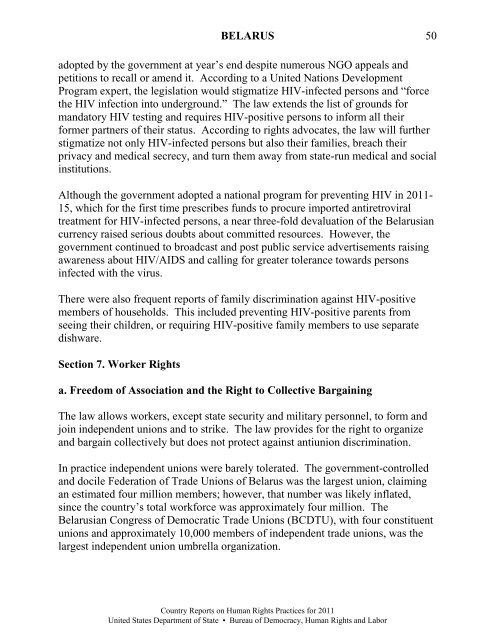belarus executive summary - US Department of State
belarus executive summary - US Department of State
belarus executive summary - US Department of State
Create successful ePaper yourself
Turn your PDF publications into a flip-book with our unique Google optimized e-Paper software.
BELAR<strong>US</strong> 50<br />
adopted by the government at year’s end despite numerous NGO appeals and<br />
petitions to recall or amend it. According to a United Nations Development<br />
Program expert, the legislation would stigmatize HIV-infected persons and “force<br />
the HIV infection into underground.” The law extends the list <strong>of</strong> grounds for<br />
mandatory HIV testing and requires HIV-positive persons to inform all their<br />
former partners <strong>of</strong> their status. According to rights advocates, the law will further<br />
stigmatize not only HIV-infected persons but also their families, breach their<br />
privacy and medical secrecy, and turn them away from state-run medical and social<br />
institutions.<br />
Although the government adopted a national program for preventing HIV in 2011-<br />
15, which for the first time prescribes funds to procure imported antiretroviral<br />
treatment for HIV-infected persons, a near three-fold devaluation <strong>of</strong> the Belarusian<br />
currency raised serious doubts about committed resources. However, the<br />
government continued to broadcast and post public service advertisements raising<br />
awareness about HIV/AIDS and calling for greater tolerance towards persons<br />
infected with the virus.<br />
There were also frequent reports <strong>of</strong> family discrimination against HIV-positive<br />
members <strong>of</strong> households. This included preventing HIV-positive parents from<br />
seeing their children, or requiring HIV-positive family members to use separate<br />
dishware.<br />
Section 7. Worker Rights<br />
a. Freedom <strong>of</strong> Association and the Right to Collective Bargaining<br />
The law allows workers, except state security and military personnel, to form and<br />
join independent unions and to strike. The law provides for the right to organize<br />
and bargain collectively but does not protect against antiunion discrimination.<br />
In practice independent unions were barely tolerated. The government-controlled<br />
and docile Federation <strong>of</strong> Trade Unions <strong>of</strong> Belarus was the largest union, claiming<br />
an estimated four million members; however, that number was likely inflated,<br />
since the country’s total workforce was approximately four million. The<br />
Belarusian Congress <strong>of</strong> Democratic Trade Unions (BCDTU), with four constituent<br />
unions and approximately 10,000 members <strong>of</strong> independent trade unions, was the<br />
largest independent union umbrella organization.<br />
Country Reports on Human Rights Practices for 2011<br />
United <strong>State</strong>s <strong>Department</strong> <strong>of</strong> <strong>State</strong> • Bureau <strong>of</strong> Democracy, Human Rights and Labor
















